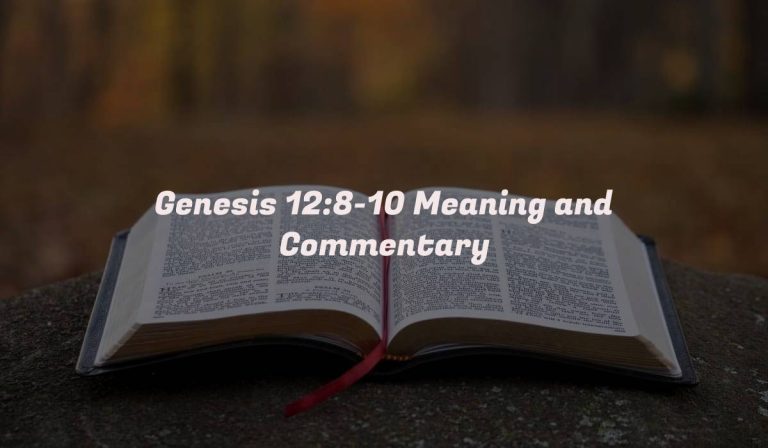25 Bible Verses About Paths (With Commentary)

Finding peace, direction and faith can be difficult in today’s society. If you are feeling lost or discouraged, it is important to look for guidance from a reliable source.
While prayer is an invaluable tool for finding growth and understanding, Bible verses about paths provide insight into how we should conduct ourselves on our own journeys through life.
Today we will take a closer look at some of the most meaningful Bible verses related to paths that can bring hope no matter what challenges you may be facing in your day-to-day life.
Bible Verses About Paths
Paths play an important role in the Bible, both literally and metaphorically. The Bible talks about different types of paths, such as the path of righteousness, the path of life, and the path of the wicked. Here are some Bible verses about paths.
The Path of Righteousness
The Bible often talks about the path of righteousness emphasizing the significance of living a morally upright life. This path requires individuals to align their choices with what God wants, maintain a strong relationship with Him, and treat others with love, kindness and respect. In short, righteousness is vital in both the Old and New Testaments and is often seen as a prerequisite for having a deep connection with God.
To stay on this path of righteousness, individuals are called to resist and turn away from sin while developing virtuous characters. Although not an easy journey, pursuing righteousness comes with its rewards such as inner peace, spiritual growth and purposeful living.
It’s important to note that righteousness isn’t just about one’s personal actions but also involves promoting social justice, fairness and mercy in communities. On this journey of righteousness and goodness, we all have to come together to create more loving societies that reflect God’s intentions for humanity.
Walking on the path of righteousness leads to not only a closer relationship with God but also serves as an opportunity for individuals to understand His purpose for their lives better. For anyone looking to deepen their understanding of God or walk closer with Him, pursuing this walk is essential.
Psalm 23:3
“He restores my soul. He leads me in paths of righteousness for his name’s sake.”
Proverbs 4:18-19
“The path of the righteous is like the morning sun, shining ever brighter till the full light of day. But the way of the wicked is like deep darkness; they do not know what makes them stumble.”
Isaiah 35:8
“And a highway will be there; it will be called the Way of Holiness; it will be for those who walk on that Way. The unclean will not journey on it; wicked fools will not go about on it.”
Matthew 7:14
“But small is the gate and narrow the road that leads to life, and only a few find it.”
Hebrews 12:13
“Make level paths for your feet,” so that the lame may not be disabled, but rather healed.
The Path of Life
In the Bible, the path of life is used as a symbol to represent our journey towards spiritual fulfillment and eternal life with God. Following this path means building a personal connection with God, growing in faith, and living according to His teachings. It also includes striving for wisdom, love, and righteousness which act as guiding principles in the pursuit of God’s truth.
As we move forward on the path of life, we are encouraged to seek wisdom from Scripture and learn from those who have walked this path before us. Through prayer, meditation, and contemplation we can deepen our understanding of God’s will and develop the ability to make sound decisions when faced with life’s challenges.
The road ahead is not always smooth sailing as we often encounter obstacles that test our faith and commitment towards this journey. But it is during these tough times that we grow and mature, relying more fully on God’s guidance. Overcoming these obstacles helps us become more resilient in our faith.
In essence, following the path of life leads us towards eternal salvation which culminates in a lasting relationship with God. By persevering through trials while walking with God, individuals can look forward to a heavenly reward that fulfills their divine purpose in life.
Psalm 16:11
“You make known to me the path of life; you will fill me with joy in your presence, with eternal pleasures at your right hand.”
Psalm 25:4-5
“Show me your ways, Lord, teach me your paths. Guide me in your truth and teach me, for you are God my Savior, and my hope is in you all day long.”
Proverbs 12:28
“In the way of righteousness there is life; along that path is immortality.”
John 14:6
“Jesus answered, ‘I am the way and the truth and the life. No one comes to the Father except through me.’”
Revelation 22:14
“Blessed are those who wash their robes, that they may have the right to the tree of life and may go through the gates into the city.”
The Path of the Wicked
The Bible describes the path of the wicked as a journey marked by sin, selfishness, and a disregard for God’s will. People who choose this path prioritize their own desires and ambitions over others’ well-being, leading to moral decay and spiritual emptiness.
Although the path of the wicked can promise immediate gratification and worldly success, these short-term pleasures often prove hollow. Instead, they lead to suffering, alienation, and a sense of aimlessness that fail to provide lasting happiness or fulfillment.
In the biblical narrative, following this path is a dead-end. Choosing to continue down this road comes with divine judgment and the prospect of eternal separation from God. This stark contrast emphasizes the importance of choosing righteousness and embracing a life full of virtue, love, and faith.
Psalm 1:1-2
“Blessed is the one who does not walk in step with the wicked or stand in the way that sinners take or sit in the company of mockers, but whose delight is in the law of the Lord, and who meditates on his law day and night.”
Psalm 146:9
“The Lord watches over the foreigner and sustains the fatherless and the widow, but he frustrates the ways of the wicked.”
Proverbs 4:14-15
“Do not set foot on the path of the wicked or walk in the way of evildoers. Avoid it, do not travel on it; turn from it and go on your way.”
Isaiah 59:7-8
“Their feet rush into sin; they are swift to shed innocent blood. They pursue evil schemes; acts of violence mark their ways. The way of peace they do not know; there is no justice in their paths. They have turned them into crooked roads; no one who walks along them will know peace.”
Matthew 7:13
“Enter through the narrow gate. For wide is the gate and broad is the road that leads to destruction, and many enter through it.”
The Path of Discipleship
The New Testament teaches us about the path of discipleship, which involves following Jesus and learning from His example. The goal is to live a life of love, service, and spiritual growth, by embodying the teachings of Jesus and sharing His message with others.
Discipleship is a lifelong journey that requires dedication and self-sacrifice. As we progress, we need to deepen our relationship with Jesus, study His teachings and develop Christ-like character. This often means letting go of worldly things, cultivating humility, and embracing forgiveness and compassion.
By committing ourselves to building God’s kingdom on earth through acts of service, social justice and evangelism we help create a more loving and equitable world that reflects God’s vision for humanity. We are encouraged to use our gifts and talents to help those in need, challenge injustice, and spread the gospel message.
Ultimately, the path of discipleship leads to a deeper connection with God and understanding of his divine plan. As we grow in faith and devotion through discipleship, we are better equipped to navigate life’s challenges towards fulfilling God’s purpose for us.
Matthew 4:19
“Come, follow me,” Jesus said, “and I will send you out to fish for people.”
Matthew 16:24
“Then Jesus said to his disciples, ‘Whoever wants to be my disciple must deny themselves and take up their cross and follow me.’”
Luke 9:23
“Then he said to them all: ‘Whoever wants to be my disciple must deny themselves and take up their cross daily and follow me.’”
John 12:26
“Whoever serves me must follow me; and where I am, my servant also will be. My Father will honor the one who serves me.”
Hebrews 12:1-2
“Therefore, since we are surrounded by such a great cloud of witnesses, let us throw off everything that hinders and the sin that so easily entangles. And let us run with perseverance the race marked out for us, fixing our eyes on Jesus, the pioneer and perfecter of faith. For the joy set before him he endured the cross, scorning its shame, and sat down at the right hand of the throne of God.”
The Path of Wisdom
Throughout the Bible, we see how important it is to seek knowledge, understanding, and discernment in our spiritual journey on the path of wisdom. Wisdom is a divine gift that enables people to make wise decisions, handle complex situations and grow spiritually.
The pursuit of wisdom involves studying the scriptures, engaging in prayer and meditation, and seeking guidance from trusted spiritual mentors. By doing so, people can deepen their understanding of God’s will and develop insight to make wise choices in their daily lives.
Cultivating moral virtues such as humility, patience, and self-control are also necessary for walking the path of wisdom. With these qualities, people can resist the temptations of sin and maintain a righteous lifestyle even during challenging times. By acting with compassion, fairness and integrity in our interactions with others, we can reflect God’s love and grace.
Walking the path of wisdom is closely linked to having a deep reverence for God’s authority and power. This fear serves as the foundation for wisdom as it reminds individuals of their dependence on God and need for His guidance and protection.
Ultimately, walking in the path of wisdom leads to spiritual maturity and a deeper connection with God. As we grow in wisdom we become better equipped to navigate life’s challenges and fulfill our purpose given by God.
Proverbs 2:6-9
“For the Lord gives wisdom; from his mouth come knowledge and understanding. He holds success in store for the upright, he is a shield to those whose walk is blameless, for he guards the course of the just and protects the way of his faithful ones. Then you will understand what is right and just and fair–every good path.”
Proverbs 3:5-6
“Trust in the Lord with all your heart and lean not on your own understanding; in all your ways submit to him, and he will make your paths straight.”
Proverbs 4:11-13
“I instruct you in the way of wisdom and lead you along straight paths. When you walk, your steps will not be hampered; when you run, you will not stumble. Hold on to instruction, do not let it go; guard it well, for it is your life.”
James 1:5
“If any of you lacks wisdom, you should ask God, who gives generously to all without finding fault, and it will be given to you.”
Psalm 119:105
“Your word is a lamp for my feet, a light on my path.”
Final Thoughts
In the Bible, there are different paths that people can choose to follow in their spiritual journey. These paths include righteousness, life, discipleship, wisdom, and the wicked.
They help us understand how our choices impact our relationship with God and shape our spiritual development. If we choose the paths of righteousness, life, discipleship or wisdom we will improve our relationship with God and achieve spiritual maturity.
We will also be able to fulfill the purpose for which we were created. However, if we follow the path of the wicked we are warned about the dangerous consequences of choosing a non-virtuous or faithless life.
Learning about these biblical paths can assist believers in gaining insight into their own spiritual journey and better understand how to handle tough decisions. Not only that but they also help inform one on how to become more Christ-like and contribute positively to society around them. Ultimately, these teachings offer a tool for both self-discovery and cultivating meaning in life through cultivating a relationship with God.






